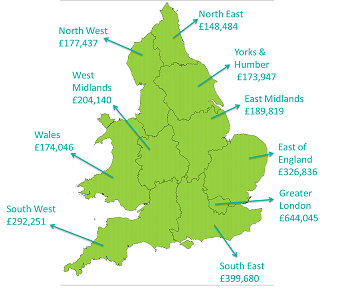News
Why order a planning search? Groundsure explain the importance of investigating planning risk
 2015 saw over 1,200,000 residential property transaction completions and 2016 is set to exceed this. The UK has also experienced a sharp increase in asking prices with the average asking price recorded in March 2016 as £303,190, a 7.6% increase on the previous year. This follows the moderate house price increases the UK has experienced since April 2012 and is driven in large part by increases in London with the average price of property in the capital soaring to £644,045.
2015 saw over 1,200,000 residential property transaction completions and 2016 is set to exceed this. The UK has also experienced a sharp increase in asking prices with the average asking price recorded in March 2016 as £303,190, a 7.6% increase on the previous year. This follows the moderate house price increases the UK has experienced since April 2012 and is driven in large part by increases in London with the average price of property in the capital soaring to £644,045.

With house prices set to rise even further as demand for housing increases, it is more important than ever to ensure that purchasers are choosing the right home for them and are aware of all potential developments well ahead of purchase.
Large scale housing developments, which have been the subject of a few stories over the past few weeks are very unlikely to be identified in the suite of mandatory searches, such as the CON29 Local Authority search, and may only be picked up by specialist companies such as Groundsure.
In any property transaction it is heavily advised the purchaser employs ‘caveat emptor’ – buyer beware, as all may not be as it seems when viewing a property over a number of weeks. With a housing shortage as great as the UK’s, the Government and developers are under pressure to build more and more, and properties can be seen popping up left, right and centre. However, this may be at times when the future purchasers have already made an offer, as has been seen in the recent case of Thorp and another v Abbots and another [2015]. In 2010 the Abbots sold their home to the Thorps for £625,000.
A Sellers Property Information Form (SPIF) was completed, which didn’t reveal anything untoward. However, after the purchase the Thorps were made aware of proposals for large scale developments in the area, proposals which dated back to before they purchased the property and it was still in the Abbotts’ ownership. Although the proposals were not set in stone, the Abbots (the sellers) attended meetings, received a public notice advising of the developments and even signed a petition against the development yet they did not disclose this information on the SPIF, when asked
1. “Has the seller either sent of received communications or notices which in any way affect the property (for example from or to neighbours, the council, or a government department)” and
2. “Has the seller had any negotiations or discussions with any neighbour or any local authority affecting the property in any way? If yes, please give details” probably to ensure their property was sold.
The Thorps took the Abbots to court, however the High Court was found to be in favour of the defendant and the case was dismissed. The lesson to take away from this is to not always rely on the sellers to disclose all information and conduct your own independent research ahead of purchase.
The Bird and Bird Case
In another case, leading solicitors Bird and Bird have been found liable in the High Court for a £2m breach of duty after failing to advise their client of a major development close to her £25m London property. Ms Chow had paid a £2.5m deposit on the 7 bedroom property in NW8, and her solicitor had undertaken a planning search which disclosed the plans for a new academy school, housing 1400 pupils and some 6 stories high, yet failed to mention the matter in their report in title - presumably due to the distance from the property, a mere 91m. Not only do large scale developments such as this have a negative impact on the aesthetics of a property, there are other lasting effects such as increased noise and air pollution as well as traffic.
Planning searches are not always the easiest to navigate, especially in large urban areas where there is a wealth of information. The new look Groundsure Planning report with an extended search radius allows for the easy identification of developments by summarising the number of house extensions, small and large projects on the front page. Alternatively, Groundsure has developed a unique report which removes misinterpretation altogether. The Groundsure Planning with Opinion utilises the expertise of Groundsure's in-house Environmental Consultants and highlights any potential major issues within an area.
There are two distinct and important conclusions to draw from these high profile cases – the first being that all purchasers should be aware of the first rule of a conveyancing transaction is to employ ‘caveat emptor’ (buyer beware) especially of sellers not disclosing information and should undertake their own independent enquiries. The second is to ensure that you thoroughly read your reports and discuss any potential issues with your solicitor or search provider.
In purchasing a specialist planning report, you are not only assisting your client in making an informed decision on their purchase but you are also supporting your firms due diligence processes and helping to protect against the risk of negligence claims. PSG offer a range of planning reports to assist you in uncovering any existing planning permissions in the area. They can also highlight land in the vicinity which may be prime for development in the future.
Help to protect the future enjoyment of your clients property purchase with a planning report from PSG.
More News

